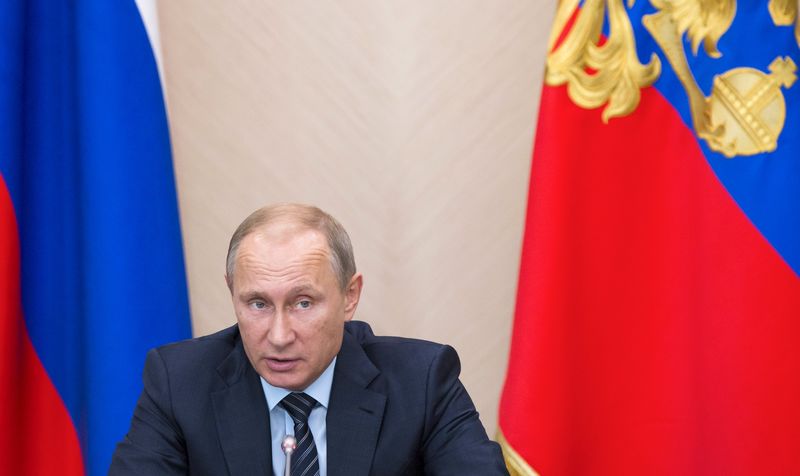By Sujata Rao and Jason Bush
LONDON/MOSCOW (Reuters) - With among the highest bond yields in the world and fears of corporate debt defaults receding, Russia is luring back some investors who seem to agree with President Vladimir Putin that the crisis-hit economy is over the worst.
Putin said last week Russia may have reached the peak of an economic crisis worsened by last year's oil price fall and Western sanctions imposed to punish the Kremlin over its role in the conflict in east Ukraine.
Fears of economic collapse drove a record $150 billion (97 billion pound)-plus in capital outflow last year, with the rouble falling 40 percent and bond yields spiralling.
But with oil and the rouble having stabilised somewhat, the tide may have turned, even if the bullishness is mostly short-term bargain hunting rather than based on firm conviction.
Sergei Strigo, head of emerging debt at Amundi has added Russia exposure, buying more rouble bonds as well as dollar-denominated sovereign and corporate issues.
That is despite his belief that recovery remains distant - data this week belies Putin's confidence, showing the economy shrinking 4.3 percent in the third quarter. Retail sales slipped last month by a tenth, the biggest monthly fall since 1999.
Growth in 2016 will flatline at best after contracting 4 percent this year and some investors expect economic stagnation to last for years.
But investors' worst fears - economic collapse and a spate of defaults by companies cut off from bond markets - have not materialised, according to Strigo.
"It's difficult to have a bullish view on the Russian economy, we just have to be content with the fact it has performed better than people expected," he said. "It's a high yielding market and as long as things don't go badly wrong you are compensated for risks."
REWARDS
Others may share that view - foreign holdings of rouble-denominated government bonds stood at 20 percent by Aug. 1, according to the latest available official data, from a 17.9 percent low in March.
Those who held their nerve on rouble bonds after last year's rout have been rewarded handsomely, with dollar returns of 12 percent this year, thanks to interest rate cuts. The underlying GBI-EM debt index in contrast, displays double-digit losses.
Dollar bond returns are a sparkling 20 percent and on corporate bonds, where investor fears mostly centered, yield premia versus Treasuries have almost halved since January.
Not all companies will survive but 70 percent of non-financial companies can repay debt from cash flow, ratings agency Moody's said last week.
Russia's debt picture, already one of the strongest in the world, has improved further as a result of sanctions; shut out of bond markets, companies have dipped into their coffers to repay or buy back debt.
Headline external debt has fallen by $80 billion this year, according to end-September central bank data. Russia also saw net capital inflows in the third quarter, after many quarters of negative flows.
"Russia has rallied because it has a fundamental underpinning, with very low debt-GDP. For a default you need to make some very serious assumptions," said Salman Ahmed, global fixed income strategist at Lombard Odier.
Noting $370 billion in hard currency reserves and an improving balance of payments surplus, Ahmed said: "From a terms of trade point of view or on geopolitics, I'd agree with Putin that the worst is probably over."
On a fundamentals-based strategy, Ahmed has a 10 percent allocation to Russian bonds, more than double its GBI-EM weight.
RELIANCE ON CASH HOARD
Equities too are luring value-focused investors who believe that beaten-down share prices adequately reflect the economy's dim outlook. Shares trade at less than 5 times forward earnings, cheaper even than turbulent markets such as Nigeria or Pakistan.
"These are shockingly low valuations... Russia has negative aspects but in our mind it has one of the best valuation profiles in emerging markets," said Michael Loukas at U.S. fund Wavefront Capital, which has raised Russia to overweight versus its share in equity indexes.
Most of these trades are tactical, however - bonds for instance have probably benefited from allocation away from troubled Brazil. With sanctions remaining in place, investors may shrink from increasing exposure.
Wavefront's Loukas says his Russia holding is smaller than investment models suggest, because geopolitical risks mean there are "too many balls up in the air".
Investors are also mindful that with oil unlikely to rise much and sanctions in place, Russia is reliant on its cash hoard. Financing next year's budget deficit alone will require taking 2.136 trillion roubles ($34.32 billion) from the Reserve Fund - almost half its current value.
The rate at which Moscow is running down the fund is causing concern about funding future deficits - without a rebound in oil or sharp spending cuts, coffers will empty in a couple of years.
TD Securities' strategist Cristian Maggio says Russia's economy and politics may have overcome the worst of market turmoil but will remain in a twilight zone.

"What you see in Brazil is a democratic process and institutions trying to deal with crisis. In Russia there is no driver for improvement, this is an economy that will stagnate for the next few years," he added.